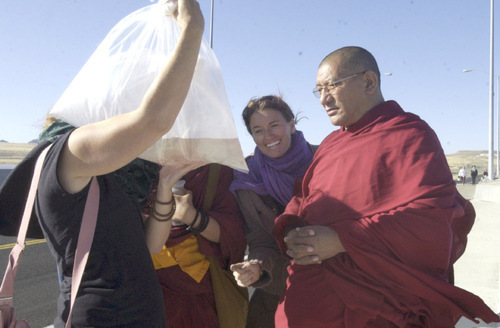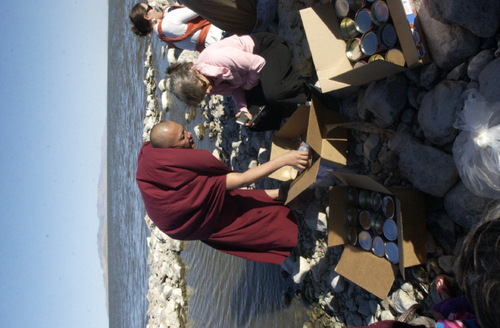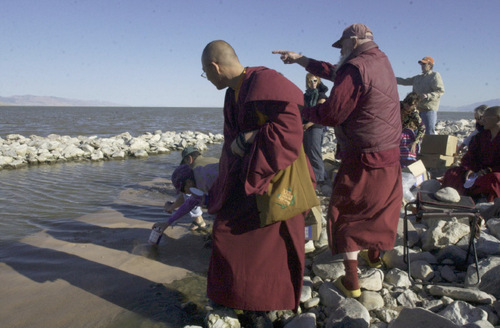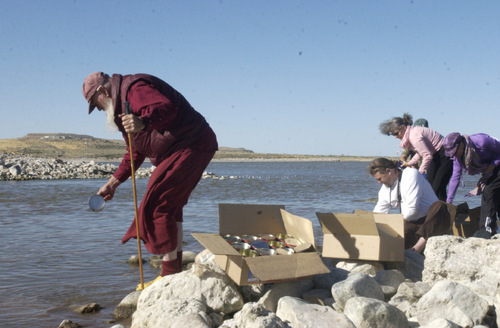This is an archived article that was published on sltrib.com in 2010, and information in the article may be outdated. It is provided only for personal research purposes and may not be reprinted.
Antelope Island • In Asia, Buddhists free caged birds to engender good karma. In the North Atlantic, they release live lobsters that otherwise would end up on America's dinner tables.
But Buddhists in Utah have a truly novel way, they believe, to benefit billions and billions of sentient creatures. They have been releasing brine shrimp eggs back into the Great Salt Lake.
The only problem: The practice is illegal, the Buddhists learned this week after releasing $3,000 worth of eggs — potentially 18 billion brine shrimp — into the lake.
"We don't even allow the brine shrimpers, once they remove the shrimp or the egg … to release the shrimp back into the lake," said John Luft, Great Salt Lake ecosystem program manager for Utah's Department of Natural Resources. "It's the possibility of destroying the whole ecosystem."
Lake biologists fear a nonnative species of brine shrimp, if introduced, could crowd out the highly prized native shrimp, each about the size of a mosquito and a prime food source for certain birds.
Each fall, brine shrimpers skim millions of pounds of shrimp cysts — eggs — off the surface of the water. The eggs are dried, canned and shipped to aquaculture farms throughout the world, where they hatch shortly after they are placed in water and become food for larger shrimp and fish.
Anyone who ever ordered sea monkeys, the once-popular mail-order pet for youngsters, has seen brine shrimp.
But to Buddhists affiliated with the Katog Jnana Ling spiritual community in Salt Lake City, the shrimp are beings that, in prior lives, were our mothers and fathers, brothers and sisters. By returning them to the lake, they believe, they are cultivating virtue that has the power to help nudge the creatures, the humans involved and, indeed, all beings toward enlightenment, the ultimate goal.
Cynthia Shumway, one of the community's spokeswomen, said the group didn't know their practice was illegal.
"Little tiny brine shrimp, just as we do, value life," said Salt Lake City resident Erin Geesaman Rabke, who carried her 4-month-old, Mesa John Rabke, in a pouch while opening and dumping cans of the eggs — a tan powder — into the lake Monday.
"They prefer to be alive rather than not," Geesaman Rabke said. "There is great merit to be had in saving lives."
—
Creatures great and small • Ransoming lives of creatures is not a common practice among Buddhists in the United States, scholars say.
But it is a long-standing Buddhist cultural tradition in some countries, said Stephanie Kaza, professor of environmental studies at the University of Vermont and an author of books on Buddhism and the environment.
"It is primarily a practice of compassion for animals," Kaza said. "It's just a way to indicate animals are sentient beings and worthy of our care."
Charles Prebish, a Buddhist scholar who teaches religious studies at Utah State University, said one school of Buddhism teaches that individuals can reach nirvana once they have attained the highest realm — humanity — practiced in the proper way.
But according to other traditions, even the most enlightened choose to remain on the path with other suffering beings until all can attain Buddhahood together, he said. By their positive acts, or good karma, they can help others along.
That's the belief of the dozen Buddhists who traveled to the Antelope Island causeway Monday, can openers in hand.
"It doesn't escape me that it is seemingly so silly," said Abigail Sullivan, of Boulder. Yet, she added, "Even if … there is no true benefit for those little shrimps, it is an actual action of considering others' lives, other beings."
Perched in rocks on the causeway's north side, participants opened 144 cans and sprinkled the eggs on the water under the eye of a revered spiritual master, His Holiness Katog Getse Rinpoche. At first, the powder stuck close to the rocky shore. Eventually, it dispersed.
Getse is considered the fourth incarnation of a great scholar and was in Utah for a week of teaching. A Tibetan, he fled that country about 13 years ago and moves from place to place in India, Nepal, Bhutan and elsewhere.
For three years, Utah Buddhists have collected money from Buddhists worldwide to buy brine shrimp eggs and release them into the Great Salt Lake on holy days. Getse's visit was the auspicious event occasioning Monday's release.
Sitting cross-legged on a boulder along the shore, Getse quietly chanted and chuckled occasionally as the others, including a lama from Colorado and Getse's translator, a monk, spread the eggs over the water.
Afterward, the group sang a dedication prayer in Tibetan, and Getse taught about saving lives.
"We receive a lot of merits here because when they [eggs] grow up, they are going to be killed," Getse said through his translator, Tenzin Weigyal. "All sentient beings want happiness. They don't want suffering, no matter what size their bodies might be."
One of those sprinkling the eggs told Getse that she donated her share of the karma to all the cockroaches, termites and centipedes she has killed.
"I live in Hawaii," she said, "and they'll take over. They'll hurt you. They'll eat your house."
But Getse cautioned against killing any creature. "According to Buddhism philosophy, we have taken birth many times before, so we have been father, mother, brother, sister before. Not only one time, but many times."
—
Cadillac of fish food • Luft, of the Department of Natural Resources, said it's unlikely the Buddhists will be prosecuted, since they didn't intend to break the law.
He also doubts there was much harm — even though it could be devastating to the lake to have an exotic species introduced. Brine shrimp thrive there because they have no predators in the water — it's too salty for fish.
Unlike most species of brine shrimp that reproduce asexually, the Great Salt Lake's shrimp reproduce both via live birth and by eggs, depending on the season. Their eggs have a high hatch rate, which makes the Great Salt Lake's shrimp the Cadillac of fish food.
The eggs released this week, Luft said, will likely hatch within a week. After those brine shrimp lay eggs themselves, they will die off with the other adult shrimp in the bitter cold of December.
"We wouldn't do anything to harm the ecology of any place," Sullivan said. "We understood that the shrimp we were putting in the lake came directly from the lake."
Sullivan, noting it is against Buddhist principles to violate the law, said she intends to apologize to Luft.
She hopes, though, to find a legal way to restore eggs to the lake.
"It won't stop us wanting to do a practice that saves lives."
About the Buddhist belief
Buddhists believe all sentient beings (animals with awareness) are reborn many times in many forms until they reach enlightenment.
Humans following the path toward enlightenment consider it an act of compassion — a positive act creating good karma — to restore life to beings otherwise destined for death.
It helps them — and the people involved — to advance.









